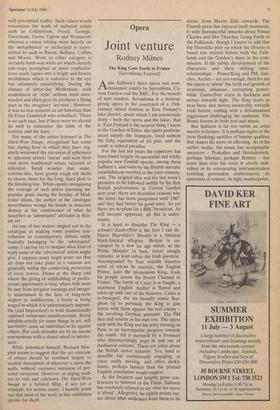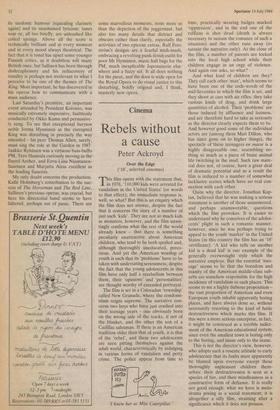Opera
Joint venture
Rodney Milnes
Aulis Sallinen's third opera was com- missioned jointly by Savonlinna, Co- vent Garden and the BBC. For the benefit of new readers, Savonlinna is a festival- giving opera in the courtyard of a 15th- century island fortress in East Finland's lake district, about which I am notoriously dotty – both the opera and the lakes, that is. East Finland is the nearest thing I know to the Garden of Eden: the opera perform- ances supply the trumpets, local salmon the fishy equivalent of foi Bras, and the result is indeed paradise.
For the last ten years the repertory has been based largely on successful and wildly popular new Finnish operas, among them Sallinen's, and visits by the British operatic establishment resulted in the joint commis- sion. The original idea was for last week's premiere to be followed swiftly by the first British performance at Covent Garden next year; there are doubtless reasons why the latter has been postponed until 1987, and they had better be good ones. As yet there are no plans for a BBC broadcast. As will become apparent, all this is unfor- tunate.
It is hard to describe The King — a schwarz-ZauberflOte is the best I can do. Paavo Haavikko's libretto is a timeless black-farcical allegory. Britain is en- veloped by a new ice age which, as the Prime Minister (a bass, relax) smugly remarks, at least solves the Irish question. Accompanied by four voluble fiancees none of whom he marries, the English Prince, later the eponymous King, leads his people across the frozen Channel to France. The battle of Crecy is re-fought; a mutinous English Archer is flayed and takes up with one of the fiancées; Calais is re-besieged; the six broadly comic Bur- ghers try to persuade the King to join forces with them against the real enemy the revolting German peasants. The PM dies and returns as his own son. The opera ends with the King and his army turning on Paris in an unstoppable progress towards the south. All is narrated by a Froissart who disconcertingly pops in and out of mediaeval costume. There are jokes about the British motor industry. Yes, hard to describe but continuously engaging, at times oddly moving, and often darkly funny, perhaps funnier than the printed English translation would suggest.
At the frequent and lengthy press con- ferences so beloved of the Finns, Sallinen has resolutely refused to say what his opera is 'about'. Allegories, he rightly points out, are about what audiences want them to be
about, from Moritz Zille onwards. The Finnish press has enjoyed itself enormous- ly with disrespectful remarks about Prinssi Charles and Mrs Thatcher Going Forth to the Falklands, though I hasten to add that the Haavikko play on which the libretto is based was written before both the Falk- lands and the Garden's share in the com- mission. If the subtle development of the characters and their shifting inter- relationships – Prince/King and PM, fian- cees, Archer – are not enough, then for me the opera is 'about' the birth and growth of irrational, inhuman, corrupting power; while Zauberflote starts in darkness and moves towards light, The King starts as near-farce and moves inexorably towards total horror, ending with a dehumanised juggernaut challenging the audience. The Bomb hovers in both text and music.
But Sallinen is far too subtle an artist merely to lecture. It is perhaps regret at the (non thinking) sacrifice of human qualities that makes his score so affecting. As in his earlier works, the music has recognisable ancestors – Prokofiev and Shostakovich, perhaps Sibelius, perhaps Britten – but more than ever his voice is utterly indi- vidual in its corruscating instrumentation (swirling percussion arabeseques), its spareness of texture, its tight counterpoint,
its sardonic humour (squealing clarinets again) and its unashamed lyricism: tunes soar or, all too briefly, are unleashed like coiled springs. Above all the score is technically brilliant and at every moment and in every mood always theatrical. The fact that it is tonal has upset some younger Finnish critics, as it doubtless will many British ones, but Sallinen has been through dodecaphonery and his rediscovery of tonality is perhaps not irrelevant to what I perceive to be one of the themes of The King. Most important, he has discovered in his operas how to communicate with a mass audience.
Last Saturday's premiere, an important event attended by President Koivisto, was musically extremely impressive, faultlessly conducted by Okko Kamu and persuasive- ly sung. To see that exceptional baryton noble Jorma Hynninen as the corrupted King was disturbing in precisely the way intended — his peer Thomas Allen, surely, must sing the role at the Garden in 1987. Jaakko Ryhanen was a virtuoso bass-buffo PM, Tero Hannula curiously moving as the flayed Archer, and Eeva-Liisa Naumanen- Saarinen and Marjatta Airas excellent as the leading fiancées.
My only doubt concerns the production. Kalle Holmberg's contribution to the suc- cess of The Horseman and The Red Line, Sallinen's previous operas, was crucial, but here his directorial hand seems to have faltered, perhaps out of panic. There are
some marvellous moments, none more so than the depiction of the juggernaut, but also too many details that distract and obscure rather than clarify, especially the activities of two epicene extras. Ralf Fors- strom's designs are a fearful mish-mash, embracing a revolting punk-fetish outfit for poor Mr Hynninen, music hall bags for the PM, much inexplicable Japonaiserie else- where and a fuzzy set. It all does nothing for the piece, and the door is wide open for the Royal Opera to do visual justice to this disturbing, boldly original and, I think, masterly new opera.















































 Previous page
Previous page